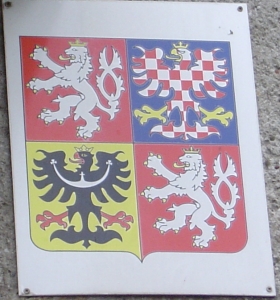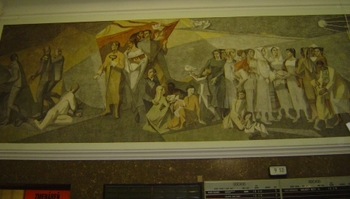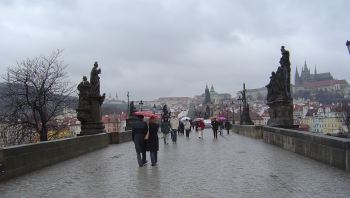We are developing the social individualist meta-context for the future. From the very serious to the extremely frivolous... lets see what is on the mind of the Samizdata people.
Samizdata, derived from Samizdat /n. - a system of clandestine publication of banned literature in the USSR [Russ.,= self-publishing house]
|
I am travelling in Slovakia and the Czech Republic at the moment and internet access is rather hard to find. This all too brief internet lifeline is a welcome fix to help alleviate my OWLS (On-line Withdrawal Lamentation Syndrome). Horror is a foreign keyboard.
But at least the locals in the deepest rural Moravia are helping me get over the internet withdrawal shakes by stuffing me full of splendid pastries, for which this part of the world is rightly famed.
Interesting glimpses of the recent communist past abound but are becoming less visible by the year.
Remember a time before the internet? Hard to believe, I know! My hosts used this to listen to broadcasts from the West.
I am with the original samizdat people from whom I took so much inspiration and the reason I came up with the name for this blog.
Today is the 16th anniversary of the Velvet Revolution or of the day when it all ‘officially’ started on Friday 17th November, 1989 at a demonstration in Prague. (There was one in Bratislava the day before but did not get initially much recognition.)
It was the death of a student, beaten by the Secret Police (or not so secret police), at the Prague demonstration that day that has pushed the students and actors across the country to articulate political demands, go on strike and start protesting in the streets daily. The theories behind this ‘final straw’ are many and varied – some argue the murdered ‘student’ was an agent provocateur who meant to start the ball rolling and enabled the powers-to-be orchestrate a peaceful, if not just, demise of the communist rule in Czechoslovakia. Time will tell the real story, I am here to remember mine.
At the time, 17th of November 1989 did not feel any special – there were some demonstrations before and usually were thinly spread around various anniversaries of dissident occassions. There was no indication that this is to be any different. With a flurry of activity from the dissidents, barely reported by the media and as usual, with more details broadcast by the heavily jammed Voice of America or Radio Free Europe.
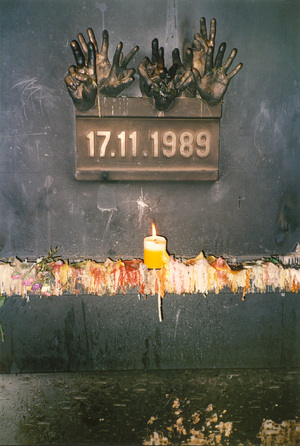
I was then a teenager, with a twist – I knew that I had no control over my future and that I faced two choices only. In order to blend in, accept the evil around me in exchange for a semblance of a ‘normal’ life. Or follow in my parents’ footsteps and forsake all that is considered good and rewarding in a healthy society, such as higher education, travel, even family and potentially freedom. I may have been very young but, alas, not young enough to be blind to the full horrors of such life. After all I had seen those around me living with similar decisions. As it happens, that choice was not real – having been part of the dissident movement, I was weighted, marked and tagged as the enemy of the state. I belonged to the dark forces undermining the society – a phrase so beloved of the communist media.
I remember the nervous elation of the ‘now or never’ moment, as we walked to the main square to meet thousands of others who felt the same. It was a powerful sensation to be surrounded by hundreds of thousands of people knowing that they are there for the same reason – an experience unprecedented in a fractured and diseased society under communism.
It was not until Monday, 27th of November, when the two-hour general strike took place, that we were sure that tanks will not be rolled out to face us. This was not without reason as on November 23rd the army declared its readiness. To do exactly what, we dared not speculate. At demonstrations between the two dates the list of those supporting the General strike was read out. There was a sense of profound relief when workers from a factory appeared on that list. We knew then that the communists had lost the propaganda war and a loud cheer reverberated across the square.
But the fight was not truly over until December 10th, when the first federal government since 1948 was appointed that did not have the Communist majority. We went to the streets once more, most of us looking for and looking forward to the sensation of true solidarity that had already started to fade. And the rest is history…
I find that my memories lack the nostalgia compulsory for any survivor of such social and political upheavals. My life has certainly changed beyond recognition as a result of the 1989 events, nevertheless I find it very hard to get dewy-eyed about my ‘revolutionary credentials’. I do treasure the experience of seeing thousands upon thousands of individuals come together in a collective action that has changed the world around them. That was genuine no matter whether it was sparked off by manipulation or whether what followed in the aftermath was far less heroic.
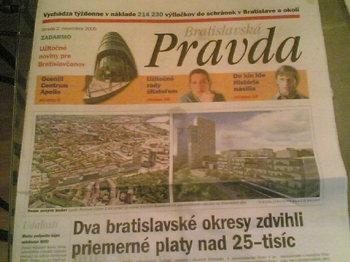
This is a picture of front page of a benign ‘cousin’ of the infamous Pravda (or more like a foundling on the same porch). It is a local paper that covers the small area of the Old Town of Bratislava, thoroughly local, post-communist, and reflecting the concerns of the local populace. Did I mention that it was local? The headline reads:
Two Bratislava districts (equivalent of local councils) have raised average wage above 25,000 [crowns].
What struck me was the active tense of that sentence � as if the local government had any control over what wages people get paid. I am told that the current Prime Minister was going around the country on a bicycle during the election campaign promising to double wages for everyone or words to that effect. Nothing extra-ordinary for a politician but people were actually disappointed after election when the wages did not double. When challenged he pointed at the fact that the wages did go up but nobody was fooled because they knew damn well that the cost increased as well. This did not seem to occur to them when the guy was making the promises though.
There seems to be the perception that the government still somehow doles out the wages as well as fiddles the cost of everything. Well, they sort of do but not in a good way. I also note the difference between the West and the post-communist East � people in the former talk in terms of rising cost of living and price inflation, people here think of terms of size of salary. I think it reflects the difference in mentality � it is thinking of how much you have rather then how much you can do�
The convincing win by the anti-leftist coalition in Poland’s elections would seem to be one in the eye for the statist left.
However the perils of the left/right labels are on prominent display here: Civic Platform Party is clearly on the side of the angels in most ways, being pro-market, pro-privatisation and generally in favour of liberty and a smaller state (though sadly they seem to think the €uro is actually a good idea).
Yet the senior partner in the winning team, the Law and Justice Party are really old style paleo-conservative statists, comparable to various European Christian Democrat parties. Although the Law and Justice Party are perhaps a bit more reactionary and stasis oriented than most Christian Democrats (and as a result no great fans of free-markets), at least that right-stasis orientation gives them a healthy euro-scepticism.
It will be interesting to see how this coalition manages to square its various circles or even holds together at all.
The Ukraine faces a choice between living in Vladamir Putin’s shadow or living under the shadow of more locally sourced rascals. Yes, I wish the protestors well in their attempt to prevent Russia’s pet poodle Viktor Yanukovych from stealing an election but in truth I do not know enough about the alternatives to Yanukovych to get any real enthusiasm for what is going on.
The fact that anti-government people have a tendency to ‘disappear’ in the Ukraine is cause enough to want to see the end of Yanukovych and his supporting but the notion that ‘democracy’ is possibly being subverted is not any real cause for excitement to me per se, given that any alternative to Yanukovych (and the pretty strange Leonid Kuchma) will no doubt use democratic processes to turn the Ukraine into just another highly regulated EU-satellite ‘aid crack’ addicted state.
So sure, good luck guys, just try to make sure you are not changing Moscow’s iron handcuffs for locally made ones with a velvet lining imported from Brussels.
My recent posting on Slovakia contained a scoop and I missed it. The leader of the Slovak governing party’s campaign for the European elections tomorrow is former ice hockey player Peter Stastny.
I knew the name (one of the few names in ice hockey I ever knew of), but failed to connect it to the poster boy of the Slovak Democratic Coalition.
From the comments to my last posting, my description of SKDU as conservative-libertarian is controversial. Considering that the new Libertarian Party candidate in the USA was selected because he campaigns on sticking to the Founding Fathers’ intentions (nationalized Post Office and all), I stand by my description for now.
What is amusing is the contrast between the Slovak and the Austrian election: the posters in Austria oppose reform, the Slovaks put a celebrity on the poster and bring in massive tax reforms in the right direction. American show-biz versus Austrian corporatism. I know which I prefer.
[Thanks to Tim Evans at CNE for providing the tip-off about Peter Stasny.]
I recently gave a presentation in Bratislava, Slovakia, on the evils of ‘competition policy’ and the ‘entry and exit costs’ economic model, which is little more than an excuse for more business-killing government intervention.
My first trip there in 1991 had been as economic and political adviser to that country’s Prime Minister when Slovakia was part of the Czech & Slovak Federal Republic (1989-1992). In those days, talking about a single tax band, a competitive advantage of Slovakia compared with Germany, why an independent Slovakia would actally reform better than under Prague tutelage and so forth was often like trying to explain Switzerland to a Pol Pot survivor.
The first photo that I took in 1991 was of the Iron Curtain seen from the Austrian side, a forest of trees leading up to the jagged line of a forest of rotting concrete.
This time on the way back I took a coach from Bratislava to Vienna airport. The following photos show the turnaround.
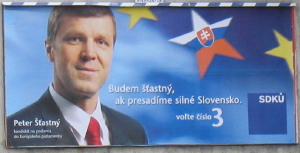
Slovakia�s ruling coalition: conservatives and libertarians
(photo taken at Bratislava bus station)
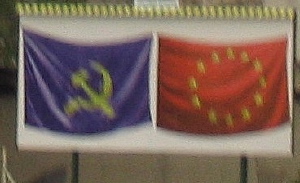
This Slovak election poster for the EU parliament
seems to get the message. (Sorry about the
quality but I snapped it out of a coach window
on a bend, outskirts of Bratislava)
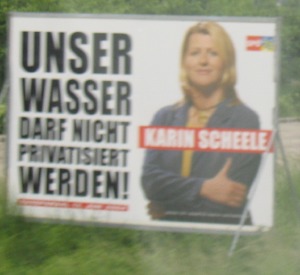
Austrian Social Democrats know what they stand for:
No privatisation!
(dotted all over the Austrian countryside North of Vienna)
Over at the excellent libertarian group weblog, Cattalarchy, there is a fine and thoughtful collection of articles, which was published a few days ago, to mark the May Day parades of old socialists with a wide-ranging broadside against what communism has wrought. I urge folk to fire up some coffee and take time out to read them all.
With all that fine material in mind, I was stunned to read a screed in the latest edition of The Spectator by ultra-rightwinger Peter Hitchens. As well as saying some decidedly uncomplimentary things about former South African President and anti-apartheid campaigner Nelson Mandela, a topic to which I may return later, Hitchens also bemoans what he claims has been the lack of any real improvement of life in countries which have been released from communism.
Really? Have there been no improvements at all? I mean, for a start, surely a declared Christian like Hitchens should be glad that fellow believers are no longer persecuted as they were in the old days of Communism. The Gulag is no longer in operation. Members of the KGB no longer drag you off in the middle of the night. And yes, key parts of the economies of those nations are not just recovering, but offering some of the tastiest investment opportunities in the world today, as this article illustrates.
There is a priceless passage in which Hitchens even refers to the elderly generation in the former Eastern bloc who miss the good old days of guaranteed jobs, even if that era came with bread queues, bureaucracy and compulsory military service. That’s the spirit! None of this messy and vulgar capitalist nonsense, with all that bothersome choice, and ugly advertising, noisy department stores and red light districts.
I honestly do not know what to make of folk like Hitchens and whether he has any coherent political philosophy at all apart from a desire to shock what he thinks is the received wisdom (not always a bad or dishonourable urge, mind). A few weeks back he wrote a superb article shredding the case for state identity cards, of the kind that any libertarian would be proud to write. Yet a few issues later we get a gloomy piece almost pining the days when half of Europe was run by the communist empire of the Soviets.
Weird.
One of the reasons for slightly less output on this august blog is that two of the editors and the inimitable Gabriel Syme were off meeting other sinister Illuminati in Prague for a fine Czech beer or six.
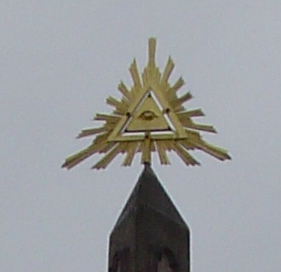
No prize for guessing where the Illuminati meet in Prague Prague, like Bratislava, is known for its splendours…
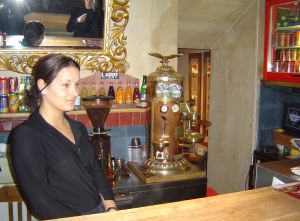
Hot… steamed in fact One of the upsides of the dire weather was that many of the usually crowded tourist attractions were almost deserted.
We meet one of the leading central European bloggers, Tomas Kohl (on the right)…
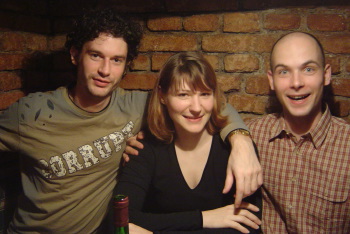
Tomas sinks some fine Czech Pilsner with Adriana and Gabriel Syme → Continue reading: Samizdata.net on the river Vltava
There is an article in the Telegraph titled Slovakian troops sent in to stop gypsy riots that reports what is happening but makes no comment on what seems to me the key underlying reason it is happening:
Thousands of police backed by 2,000 soldiers in the ghetto towns of eastern Slovakia appeared to have temporarily ended attacks by mobs forcing their way into food shops. Near 100 per cent unemployment has brought thousands of Roma gypsies out on the streets
[…]
Demonstrators in one town gathered peacefully, shouting: “We want to eat.” Others said their families were starving since the cuts [ in state unemployment benefits], meant to prepare the country for European Union entry, were implemented on Jan 1.
Tibor Tutak, 39, said: “We know stealing isn’t a solution but I cannot let my children go hungry. What has happened so far is nothing compared with what will happen if the government doesn’t do anything.”
Roma leaders threatened further trouble unless the Bratislava government rescinded dramatic welfare reductions which have halved the incomes of many families. Unemployment among some gypsy communities is close to 100 per cent.
It is regrettable for anyone to go hungry but for 100% unemployment to prevail amongst significant sections of the gypsy community in Slovakia, that is not bad luck or economic vagaries, it is a lifestyle choice. What is more, what Tibor Tutak is actually saying is that he dislikes having to do the stealing himself, given that he and his community had gotten used to having the state do it for them. The fact is no one owes anyone else a living by right at their expense, particularly not if they decline to participate in the economy as anything other than parasites. The forceful official Slovak response seem entirely appropriate to me and I hope they do not even consider allowing themselves to be shook down for larger the ‘welfare’ payments.
No one is forced to live in a gypsy community in this day and age… yes, I know some people will bring up the infamous walls built Czech authorities after years of complains by local people. These were designed specifically to keep gypsies away from the rest of the community in a town near Ostrava a few years ago, but that was hardly an enforced ghetto in the traditional European sense of the word, as there were no laws compelling gypsies not to live elsewhere.
I also realise gypsy communities are on the receiving end of considerable prejudice and discrimination, though it needs to be said that not all of the reasons for the wider community’s hostility towards them are baseless. The gypsies are a separate cultural group and are certainly entitled to live according to their ways… provided these ways are not based on theft, be it directly or via the state and therein lies the issue at the heart of what is happening now in the Slovak Republic. Let me give the last word to Czech blogger Tomas Kohl who writes what the Telegraph article conspicuously did not:
These people are not victims of reforms. They haven’t been wronged by the government today, but when the State decided it’s a good idea to subsidize people for not doing anything and punish them when they moved a finger, it’s like giving away dope, making everyone addicted, then halving the supply.
Is there an easy way out? No. Yeah, I could say just abolish the idea of Caring Government, and it has certain utopian appeal I like, yet there is no political force there that would be capable of doing just that. Unless they send in an infantry regiment, the unrests can continue for a long time, until the underclass moves west, to countries where they still give lunches away for free.
For some years, I have preferred to take my holidays around the Baltic (herewith classified as Eastern Europe, because it is north east of the British Isles and the Finns come from the Urals anyway). Larking about in the Nordic and Baltic countries always includes a visit to the local museum concerning the Second World War and the Resistance. These museums often give a snapshot of the the way these countries view themselves, their place in the world and their history.
The most disappointing museum that I ever came across was in Helsinki, Finland. Their military museum, near the Lutheran Cathedral, included an exhibition covering the Finnish contribution to the Second World War which finished at the end of the Winter War. The wartime alliance with Germany from 1941, which one could view as a necessary defence against Stalinism on the grounds that my enemy’s enemy is my friend was excised from their exhibition. This was the state of play in 2000 and I haven’t been back to the museum since, so they may have extended the scope since but the omission at that time was rather surprising. → Continue reading: Resistance and War Museums
Having returned to the land of hope and glory after almost two weeks of hectic holiday season and a limited access to internet, I have the need to blog of things I have seen.
I spent Christmas in Bratislava, the capital of Slovakia. After such splendid reviews of the town here on Samizdata.net, I was wondering whether it would live up to his impressions during the cold winter days. The Christmas markets in the centre of town, a tradition established in 1993, have a certain magic that increases with copious quantities of hot mead and wine.
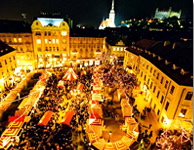
The crowds are impressive, with density matching that of any western shopping experience. There are many international brands present, many a multinational appearing in the ‘small town with big potential’. The most impressive sight, probably because most unexpected, was the vista alongside a new road by-pass relieving the centre of Bratislava of heavy traffic. The road is lined with enormous warehouses, hypermarkets, showrooms for car makers such as Mercedes-Benz, Porsche, Nissan, Audi, Jeep, Chrysler, there is Fuji Film and Coca-Cola. Driving along you could be in any western country. In the centre of town I have seen designer shops frequented mostly by the rich even in the West. I believe I caught a glimpse of Bang and Olufsen. Whatever you think of the brand, it is a huge leap for the design-conscious of Bratislava.
This all is very good and a superficial visitor might conclude that Bratislava represents a successful marriage of the charm of a small provincial city with a multinational presence and that Bratislava benefits from its proximity to Vienna without being reduced to a charmless suburb of its larger and more internationally renowned neighbour. Perhaps I should leave it at that and spread the good word without digging underneath the surface. Unfortunately, I stayed there long enough to encounter what lies beneath or, as we Samizdatistas would say, in the metacontext. → Continue reading: Potemkin village of capitalism
|
Who Are We? The Samizdata people are a bunch of sinister and heavily armed globalist illuminati who seek to infect the entire world with the values of personal liberty and several property. Amongst our many crimes is a sense of humour and the intermittent use of British spelling.
We are also a varied group made up of social individualists, classical liberals, whigs, libertarians, extropians, futurists, ‘Porcupines’, Karl Popper fetishists, recovering neo-conservatives, crazed Ayn Rand worshipers, over-caffeinated Virginia Postrel devotees, witty Frédéric Bastiat wannabes, cypherpunks, minarchists, kritarchists and wild-eyed anarcho-capitalists from Britain, North America, Australia and Europe.
|
